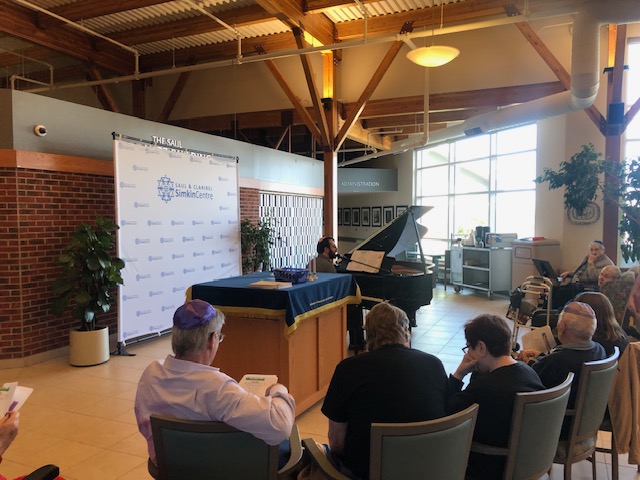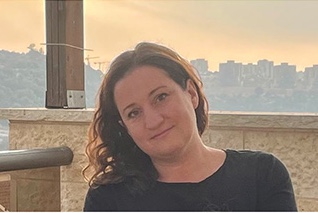Local News
Demolition complete of old Chesed Shel Emes house – new building expected to be completed in 2021

By BERNIE BELLAN
It was just over a little more than a year ago that the Chesed Shel Emes (the Winnipeg Jewish community’s burial society) launched a capital campaign, with the intent to build “a new facility to meet the needs of the Jewish community for many years to come,” an announcement in the May 10, 2019 issue of this paper said.
That announcement went on to say that “Chesed Shel Emes’s south building is 114-years-old. It was built in 1905 as a private residence, and was purchased by the newly established Chesed Shel Emes in 1930. The building has met the needs of thousands of families over the years, and is showing its age. The attached chapel, built in 1947, is in good repair and will be a beautiful complement to the new building.
“The new building will provide a better and more comfortable experience for mourners and other visitors,” says Rena Boroditsky, Executive Director of the Chesed Shel Emes. “And for our volunteers, we are designing this new space with safety top of mind.”

“Having an effective and dignified infrastructure to prepare the deceased for burial and to support mourners is something a strong community does for itself.
“The funds raised will be used to: demolish the existing south building; build the new structure; protect the north building during demolition and construction; and furnish the new building with new equipment. The vision is of a building that is handsome, durable, and comforting and that includes state-of-the-art equipment for the care of the deceased. “The new 4,000-square-foot building will include the following features:
“A new, larger tahara room with stainless steel counters and more room for volunteers to perform their work safely (“tahara” is the ritual washing and dressing of a Jewish person in preparation for burial);
“new, state-of-the-art refrigeration units;
“new mechanical lifts for transferring bodies more safely;
“enhanced safety features to improve the experience of volunteers and ensure the dignity of the deceased;
“expanded storage space for caskets, shrouds, and supplies;
“an elevator for guests and volunteers with mobility issues;
“wheelchair access to the building;
“private meeting spaces for mourners, extended family, and friends to gather (currently, mourners use the boardroom);
“more comfortable accommodations for shomrim (“shomrim” are guards who watch over the deceased, so that they are never alone);
“a safer, more accessible back staircase and entrance way;
“enhanced washroom facilities;
“refurbished office space;
“state-of-the-art heating and cooling systems; and other features to create better conditions for mourners, staff, and volunteers, and to ensure the dignity of the deceased.”
The capital campaign is still ongoing – although it has taken a pause during this unprecedented time of global emergency. This past week I spoke with Rena Boroditsky and with Bob Freedman, former CEO of the Jewish Federation, and now a fundraising consultant to Jewish organizations.
During our phone conversation we talked about how the capital campaign has gone. As well, we talked about the history of the Chesed Shel Emes. Following are some excerpts from our conversation:
Bob began the conversation by noting that the “Chesed didn’t come into existence as an organization until 1930 when they bought the house. Up until 1930 when someone passed away they would be prepared in the Jewish tradition – in someone’s home.
“Come 1930 they had a building where the bodies of the deceased would be prepared – up until a few months ago when that operation was moved over to Chapel Lawn” Funeral Home.
As far as the move to Chapel Lawn goes, Rena had this to say: “They have a new 25,000 square foot funeral home that they built on their property, so we have a dedicated room; we are not sharing their prep room. That’s where we are doing tahara; our supplies are kept there.
“We have a dedicated office space, where the shomer sits.”
I asked how the capital campaign has gone to date?
Bob said: “The capital campaign has raised $2.8 million – that’s pretty darn good. Remember, in a capital campaign donors may honour their pledges over a number of years; this campaign has had about half the pledges paid in full, so we have the money to begin the project now.
“By the way, we’ve successfully connected with about 400 donors that have already concluded pledges and there are hundreds more that we haven’t even connected with. This is very much a community organization that serves every aspect of the community and we want everyone in the community to participate at whatever level they’re able to. We’re probably going to extend the campaign because of different circumstances, including COVID-19. We probably would have been more active in the past month or two, but for obvious reasons, took a pause – and so, ending the campaign around the end of May or June, it’s more realistic now to end it around the end of 2020.”
I asked how many individual donors there have been?
Rena answered: “I’d say about 400 (including families).”
I said: “That means the average donation works out to about $7,000.”
Bob noted though that “But, we’ve had donations of $18 and we’ve had a donation of $500,000 – so it varies. Unlike other capital campaigns we’ve had (like the Campus), there are no dedication opportunities.”
Rena added: “Donors will be recognized on a donor wall in the new building.”
Bob: “By the way, Bernie, do you know when was the last time the Chesed ran a dedicated campaign in the community? 1945. That was to raise money for the chapel, which opened in November 1947.
“The Chesed does have charitable status and people have given money, but has the Chesed gone out and raised money? No.
“When we got started on the project we had to develop a donor database because, except for those people who have given money from time to time, the donor base primarily consists of people who are now deceased.”
I asked whether, once the building is done, people “are going to be able to walk through and see where the money has gone?”
Rena: “We will still have a shomer space for families. I’ve been giving tours of the house for the past 20 years – and I’ll still be doing that.
“It’s going to be a two-storey building. It’s going to be a little narrower than what we currently have but a little bit longer from the front to the back…We expect to have it done in about a year.”
Bob: “With COVID-19 there’s certainly been a slowdown in construction activity in the city. We retained Akman Construction as a general contractor. We’re pretty satisfied that the numbers (from the various sub trades) that came in are pretty good.”
I noted the Chesed has to keep going – no matter what the situation.
Rena said: “The Chesed Shel Emes never closes. We had 17 people pass away in April.”
I asked: “How has it been going to Chapel Lawn? Has it been a fairly smooth transition?”
Rena: “We haven’t been down even one day. We had a tahara the day after we moved. It’s been a bit of a learning curve. Their staff is amazing; they are so accommodating. It’s spotless there. They’ve been wonderful.
“That being said, we are not in our own space; there’s some accommodation that needs to be made – just in the way we do things, so we will be happy to get back to our own space – but it’s been a very smooth transition.”
We talked about the effect that COVID-19 has had on synagogues here when it comes to arranging funerals. Rena observed that funerals are limited to the pallbearers and the grave diggers now. As well, there are no meals of consolation, she pointed out.
Still, I wondered whether the relatively large number of funerals in April might have led to a fairly significant infusion of money into the synagogues.
Rena pointed out that the likelihood was that many of those funerals had been prepaid, so that wouldn’t have added to the synagogue’s cash flows. “They may be busy but that doesn’t mean they have any cash flow,” she observed.
Bob said: “We’d like to raise between $400-500,000 more. We’re confident we’ll do it, although we’re quite aware the current situation is not the best of times for many donors. In May and June we’re going to reconnect with people that have already been spoken to and, if we can conclude some of those pledges earlier rather than later, we’ll try to conclude everything by the end of the year. Because of the Federation’s emergency campaign we’re not going to connect with people who have not been spoken to yet.”
Rena: “Anything we might collect over and above what we need for the building will go into our endowment fund, which we established at the Jewish Foundation.”
At this point Bob Freedman interjected an interesting bit of history:
Bob: “Bernie, have you seen the safe? It must weigh 500 pounds.”
“So, what’s in the safe?” I asked.
“Not cash, unfortunately. When I first opened the doors, I opened a bunch of little books. People who passed away were recorded – by pencil or pen, by name – their Hebrew name, the date they died. So I looked up my mum, I looked up my dad. It’s really a history of the Jewish community. There was a big picture of the machers from the 1930s – all men, of course. There was a big picture of the ladies’ auxiliary – all looking very stern.
“By the way, if those men knew that the place was being run by a woman, they’d all be spinning in their graves.
“When you ask someone how do you define a Jewish community, as opposed to a community with Jews living in it, there are three things: A shul, a school, and a chevra kadisha – a burial society.
“Burial is one of the first things people thought about when they came from the old country. They looked for a place to bury people.”
Rena: “Chesed Shel Emes Inc. was formalized in 1930, when they purchased the house. Before that they may have called it chevra kadisha. My information came from Mr. (Ike) Permut, of blessed memory (who was President of the Chesed board in the 70s, 80s, and half the 90s).
Bob “And the original bylaws were written in Yiddish”
One final note: If you would like to make a contribution to the Chesed Shel Emes capital campaign, go to www.ourtradition.ca
Local News
This man – Michael Kalo – has been defaming prominent Winnipeggers online for years, but now he’s getting a taste of his own medicine

By BERNIE BELLAN (Posted May 3, updated May 8)) There’s a particularly ugly side that often comes with being in the public eye – and that’s being on the receiving end of some of the most vile and awful comments, often threats – sometimes on social media, sometimes in emails, and sometimes on websites.
For years now many prominent Winnipeggers (almost all of them Jewish) have had to endure just that kind of vicious attack from someone by the name of Michael Kalo. But how do you fight back against someone who writes some of the most awful things – and then sends them out to various members of the media (including me), all the while hiding behind a series of aliases? There’s no point in suing him for defamation; he’s penniless. (The police have seized his computer in the past and are well aware of him, but the individuals whom he has defamed have always been reluctant to have the Crown press charges, thinking that it will only draw more attention to him – which is what he seems to want.)
But I’m different – and I’ve finally had enough of his crap.
I just received another email from Michael Kalo. This time I told him I was going to post his email and my response – but I was going to reveal his true name. (He sent the email under the name “Harvey Weinstein”.)


It must be particularly embarrassing for Michael’s two very accomplished daughters, Stephanie Kalo and Emily Kalo, to have people realize who their father is.
I’m also posting a video that was sent to me that shows Kalo engaging in an argument with someone (and the identity of that person was not revealed to me by the person who sent me the video.) In it you can hear Michael explain why he’s consistently called Ben Carr a “kike”, “a spoiled Jew boy,” along with some other choice epithets. (Kalo has sent out numerous emails defaming Ben Carr using the name “Mohammed Greenberg” as the sender.)
First, here’s the email in which Kalo goes after Jacob Brodovsky, who recently left his post as co-executive director of BB Camp following a storm of controversy (about which you can read elsewhere on this site):
Dear Bernie:
Jacob Brodovsky is a vile and entitled (self-hating) JEW BOY Bastard, who should keep his long nose away of the private affairs of a foreign sovereign and free country he knows nothing about.
We hear that him and his JAP wife Lexi are expecting a baby.
We respectfully believe that if a boy, they should name him Adolf, and that in a case of a girl, her name should be Eva.
In terms of these scums’ future employment, we suggest that they now look into finding, for a change, a real job.
Perhaps by moving to Gaza and starting a summer (training) camp for (young) terrorists.
Indeed, the BB Camp Board reached the right decision as to these two haters of Israel, the brave and only Jewish state.
Having said this, we wonder why the two were hired (and overpaid) at the first place, and more importantly why it took that long to finally terminate their positions.
We thank you for your ongoing attention to this matter, in our view second only to the scandal of (former Mayor) Sam Katz stealing millions of dollars from the City’s hard working taxpayers and its Police force without, to this day, facing any consequences (other than having to move from Tuxedo to Headingly…lol).
Go (IDF’s) Jets Go!
Harvey W.
And here’s how I responded to Kalo:
You know what I’m going to do Michael. I’m going to print your letter on my website – but I’m going to say that it was sent by someone named Michael Kalo, who has been defaming various Winnipeg Jews for years. That way it will have the opposite effect of what you’re intending. I’m also going to post the video in which you call Ben Carr (and the person filming the video) a kike.) And if you want to come after me the way you’ve been going after anyone and everyone who provokes your ire, go right ahead. (You seem to have a real hate on for successful Winnipeg Jews. Is it because you’re such a failure in life yourself?) And I’m going to bcc this email to some of the people you’ve been defaming so that they can see how much of a fool you”ve been making of yourself for years.
-Bernie
And here’s the video of Michael (who is apparently walking away with a Ben Carr sign tucked under his arm):
Local News
Rabbi Matthew Leibl’s Friday afternoon service at Simkin Centre has grown in popularity

By BERNIE BELLAN In November 2023 I published a story in The Jewish Post & News about the first-ever Friday afternoon “Erev Shabbat” service at the Simkin Centre, which was held October 27, 2023.
It was an opportunity for me to see how much of an impact the newly spiritual care aide at the Simkin Centre, Rabbi Matthew Leibl, was having on residents. But that was in 2023 – only 2 years after the Simkin Centre had emerged from the most harrowing period in its history.
As you may recall, when Covid 19 began to spread in early 2020, it was personal care homes across Canada that were hit hardest – and the Simkin Centre was not spared the ravages of Covid. A total of 11 residents passed away at the Centre in 2020 and 2021.
Another result of the Covid epidemic was that the number of non-Jewish residents at the Simkin Centre jumped by quite a large number during the epidemic. Here are some figures showing how many more non-Jewish residents moved into the home by 2021 than had been there previously:
2017 – 67 non-Jewish or 33.5%
2018 – 63 non-Jewish or 31.5%
2019 – 71 non-Jewish or 35.5%
2020 – 61 non-Jewish or 30.5%
2021 – 86 non-Jewish or 43.0%
According to Laurie Cerqueti, CEO at the Simkin Centre, as of May 2, 2025, 44% of the residents are non-Jewish while 56% are Jewish.

Rabbi Leibl had been hired in the spring of 2023. His hiring was enabled by a grant from the Jewish Foundation of Manitoba. Here is how the Foundation explained what its purpose was in making a grant to the Simkin Centre for the hiring of a full-time spiritual care aide:
“I know how important spiritual care is in our type of setting,” said Laurie Cerqueti, Simkin Centre CEO. “For our residents, our families, and our community.”
Since she took over the CEO role, Laurie’s thoughts had been directed to ‘How can we serve our people even more than we are now? How can we make this bigger and better?’
This sparked the idea that someone should be brought in to look at what they were doing regarding spiritual care to see where gaps and opportunities lay to develop the program.
The Simkin Centre hired Rabbi Matthew Leibl as the person to fill the role, someone Cerqueti thought would be a perfect fit f for what they’were hoping to do.
“As I spoke with Matthew about this opportunity, we see it as an opportunity to make a significant difference for the residents and their families,” said Cerqueti.
This interaction with the Simkin Centre is not Rabbi Leibl’s first. He has been involved with the Simkin Centre for over 15 years, first working there at age 21. That year, he did concerts three times per week for the residents.
“I found that the music and performing was an incredible way to connect with the people there,” said Rabbi Leibl.
He recalled a story from that time frame where he was performing Oseh Shalom, and one resident who had been, to that point, without her memory and less present, began to mouth the words along with him. The song helped her break through what she had been dealing with.
“That moment was truly a game changer for me. I’m so excited to be able to give back to a place that helped people in my own family and was a great place for me while I was figuring out my way many years ago,” said Rabbi Leibl.
“Simkin is such a special place, and what they’re doing there is awesome.”
In the year and a half since I was present at Rabbi Leibl’s first ever Friday afternoon service at the Simkin Centre much has changed. Most of the new residents who have moved into the centre have, once again, been Jewish. But, in recognition of how many residents are not Jewish the centre has begun offering services for different denominations as well. The May calendar of events lists a Catholic Mass, an Anglican service, a Christian Bible Study, and a Hymnsing.
But it was Rabbi Leibl’s Erev Shabbat service I was interested in seeing again – some 18 months after the first service he had conducted, to see whether it had changed – and how many residents came to watch.
The atrium of the centre was filled with residents on Friday, April 26 – quite a few more than that October 2023 service. The increased number of attendees was also a reflection of how many more of the centre’s residents, once again, are Jewish. (In case you weren’t aware, if there’s a vacant unit at the Simkin Centre and someone who is Jewish is on the wait list to gain admission into the centre, that individual will be given first crack at moving into the centre. I had been told by Laurie Cerqueti that the 14 most recent new residents in the centre were all Jewish.)
There was one other aspect to Rabbi Leibl’s service which was brought to my attention. One of the residents at the Simkin Centre, Carol Manishen, also has a son living in a Shalom Residence: Josh Manishen. When Carol’s husband, Wayne, saw me at that Friday service he told me that he often comes early with Josh – before the start of the regular service at 4:00 pm, and Josh sings various Hebrew prayers, accompanied by Rabbi Leibl on the keyboard. To watch a video of Josh singing, click here:
Two more things to add though: First, Rabbi Leibl is now a regular participant on a podcast that is put on by CJN (what used to be known as the Canadian Jewish News) called “Not In Heaven.” You can find it simply by Googling CJN and scrolling down under the Podcasts link.
Also, since Rabbi Leibl and I go a long way back – and we both have a fond taste for sarcasm, he singled me out from among the audience and said to everyone there: “We’ve even got a reporter from the Jewish Post here.”
I couldn’t help but respond – in my usual facetious manner, that I was there to do an exposé.
To which, Rabbi Leibl retorted: “You can call it “Sex, Drugs, and Candlesticks.” Hmm, I wonder how much more there is about the Simkin Centre that I haven’t learned yet?
Local News
Well, that didn’t take long…BB Camp Board announces hiring of two new co-directors

(Posted April 27) In a span of a little more than two weeks, BB Camp has gone from parting ways with one of its co-executive directors, Jacob Brodovsky, to the hiring of two new co-directors. (We have been attempting to ascertain the status of Lexi Yurman, who was also camp co-executive director with Jacob – who also happened to be her husband, and who is now on maternity leave. Would she be entitled to return as co-executive director once her maternity leave is up, we wonder?)
The BB Camp board released a press release announcing the new hires at 12:42 pm today. Interestingly, there is no mention whether the positions that are to be filled by the two individuals, Sarah Gould and Aliza Millo, are to be permanent or temporary. Also, the two women are referred to as co-camp directors, not co-executive directors. Is there any significance to that, we wonder? Since no one from the BB Camp board has responded to any questions we have posed to them since this whole mess began, we won’t hold our breath waiting for answers to any of the questions we’ve just asked here either.
Here is the complete text of the BB Camp board announcement:
Dear BB Camp Community,
On behalf of the Board, we wanted to let you know that we acknowledge that the last week has caused much stress and uncertainty. We have felt it too and have been working very hard to ensure that the summer season unfolds as we all expect.
We are extremely excited to share with you that our 2025 summer senior Camp leadership team is now in place!
Please give a BB Camp W-E-L-C-O-M-E to Sarah Gould and Aliza Millo!

Sarah Gould: co-Camp Director (Wilderness and Operations)
Sarah is returning to BB Camp as co-Camp Director (Wilderness and Operations). Sarah’s history with BB Camp stretches back decades. She spent many formative summers on Town Island—as a camper, counselor, canoe instructor, and AC out-tripper. After BB, she took her skills to Camp Hatikvah in BC, where she helped develop and expand their wilderness and out-tripping program. Sarah has an intimate knowledge of wilderness programming, the importance of integrating Jewish values into outdoor education, and as camp alumni and a current camp parent, has a clear understanding of our community’s interests and hopes for BB Camp’s future.
Sarah has been fortunate to spend every summer of her life at Lake of the Woods. Her family cottage is on Channel Island, directly across from Town Island. She has strong ties to our Lake of the Woods neighbours and an ability to navigate the lake and Kenora. Sarah also was a key volunteer on the Friends of Town Island campaign, through which Camp was able to successfully partner with the Nature Conservancy of Canada to have Town Island designated as a protected area—ensuring its legacy for generations to come.
Professionally, Sarah has years of experience in education, research, and community organizing. She taught anthropology and international development at Trent and the University of Toronto and now works as a researcher and consultant in health studies. In her community life, she leads a neighborhood organization in Toronto, where she has spearheaded grassroots initiatives—from building a skating rink to coordinating with city officials and local stakeholders on community improvement projects. Sarah is also active in the Jewish community, including advocacy for Israel and supporting students facing antisemitism on campus.
Sarah is excited to be returning to Town Island and the BB Camp family for an amazing summer of 2025.

Aliza Millo: co-Camp Director (Programs)
Aliza’s history with BB Camp dates back decades as well. She spent many years at Camp as a camper, counselor, section head, and LTP Coordinator. After Camp, Aliza pursued a career she felt was most adjacent to working at Camp and transitioned into the classroom. She moved to Toronto to pursue her education degree, where she also completed a Jewish Education Certificate at York University.
For the next seven years, Aliza taught at the Toronto Heschel School, a school dedicated to tikkun olam and social justice, with a particular focus on environmental stewardship and sustainability. While there, Aliza taught grades three through seven, with a greater focus on the upper elementary years, teaching Judaics, Hebrew, and General Studies in a pluralistic, integrated setting.
After 10 years in Toronto, Aliza was happy to move back home to Winnipeg. Aliza met her future husband David Azuelos at BB Camp many years ago; to get a sense of how important BB Camp is to Aliza, she had her wedding on Town Island. Since her return to Winnipeg, Aliza has worked at St. John’s-Ravenscourt School, teaching Grade 4, cultivating an environmental leadership team at the Junior School level, and even bringing groups of Grade 4 and 5 students to Town Island for Outdoor Ed. Aliza has also helped organize and fundraise for Kendra’s Walk, a student-led initiative at SJR supporting teens living with cancer.
Aliza’s true passion lies in building community, whether in the classroom or at Camp. Since her time as a camper, she has enjoyed returning to the island for Work Weekend, volunteering in the kitchen, and serving on the Alumni Committee ahead of the 70th Alumni Weekend. She is most passionate when working with children and believes in strong communication with parents to build meaningful and supportive relationships. Having worked in a kindergarten to Grade 12 school setting, she has enjoyed maintaining lifelong relationships with students and families in the community.
Aliza is excited to be bringing her two boys, Judah and Dubie, to Camp. She is thrilled to be returning in this position — working with and mentoring the already incredible staff, and helping to foster deep and meaningful connections to Jewish values, traditions, and culture. Aliza looks forward to helping build a strong, nurturing community where every camper feels a sense of comfort, belonging, and pride in who they are — and in being a BB Camp camper.
***
The Camp Board of Directors is grateful that Sarah and Aliza, two lifelong BB Campers who together have an exceptional skill set, will be leading our community’s beloved Camp this summer. We are looking forward to another great Camp summer, full of amazing Camp memories. We will be reaching out directly to Camp families with more information. Please bear with us as our new leadership team gets up to speed and starts working with our current staff. Reach us at info@bbcamp.ca
Ed.note: Here’s a comment we received through our “contact us” link: (Readers of this website should be aware that it is run independently of The Jewish Post newspaper. I will forward any comments sent to me that are meant to be letters to the editor of the paper, but the proper email address for the paper is contact@thejewishpost.ca)
Letter to the Editor re BB Camp
I am a former member of the Board of BB Camp and served as Board Chair for a number of years. I am disgusted in the manner in which the current Board responded to to the public assassination of its Executive Director by dishonest Israeli extremists in our community. I am equally disgusted that what should have been a private internal human resource issue at the Camp was made public by the Board through its e-mails to the community which essentially made it impossible for the Executive Director to continue in his position and which likely tarnished his reputation. All I can say that is that I hope Jacob received a large monetary settlement from BB Camp.
-Irwin Corobow

You must be logged in to post a comment Login